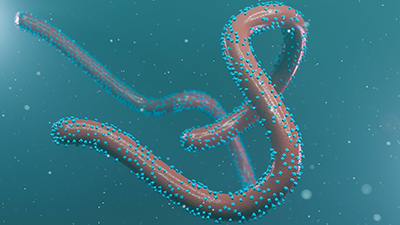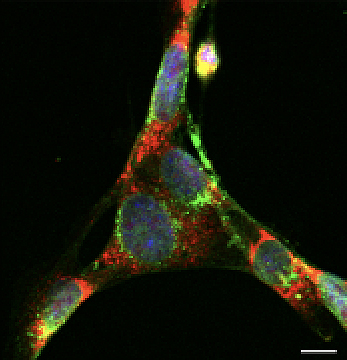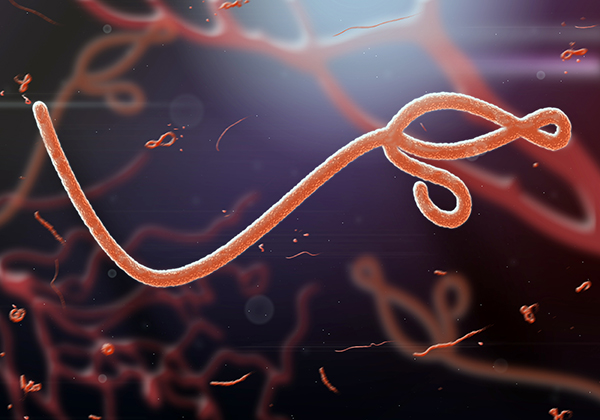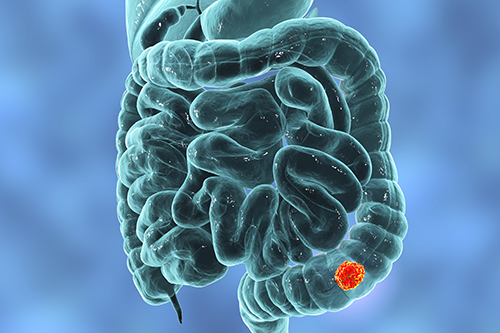Author
Non-neutralizing antibodies from a Marburg infection survivor show therapeutic potential
Aug. 28, 2020—By Sohini Roy Marburg viruses cause a hemorrhagic fever in humans, with a fatality rate of up to 90 percent. Currently, Marburg disease can neither be prevented by a vaccine nor therapeutically treated. Understanding how the immune system of a MARV survivor reacts against the virus can yield clues to design a treatment. With this...
STING pathway stimulation promotes survival in preclinical models of neuroblastoma
Jul. 16, 2020—By Sohini Roy Neuroblastoma, an aggressive pediatric brain cancer with a high mortality rate, boasts a unique microenvironment that puts the brakes on infiltrating immune cells and dampens their anti-tumor activities. Clinicians use a therapy called immune checkpoint blockade to activate a patient’s immune cells to recognize and attack malignant cells in many types of...
Recurrent UTIs linked to hidden reservoir
Jul. 9, 2020—Jul. 9, 2020, 1:30 PM by Sarah Glass Urinary tract infections (UTIs) frequently recur due to bacteria constructing safe havens within the host. While infection is frequently caused by uropathogenic Escherichia coli that originates in the gut, little is known regarding vaginal colonization leading to recurrent UTIs. John Brannon, PhD, Maria Hadjifrangiskou, PhD, and colleagues...
Two is Better Than One: Combatting the Ebola Virus
Mar. 26, 2020— By Sarah Glass Many people associate Ebola with the previous viral epidemic of the last decade, but, especially in light of the current global SARS-CoV-2 pandemic, few are aware that there is currently an active outbreak occurring in the Democratic Republic of the Congo. This deadly virus continues to wreak havoc in Africa, where...
Researchers developing potential coronavirus antibody therapies
Mar. 24, 2020—by Bill Snyder Vanderbilt University Medical Center is teaming up with academic, governmental and corporate partners in an unprecedented, fast-tracked global effort to develop antibody-based treatments to protect people exposed to the 2019 novel coronavirus disease, COVID-19. Researchers from the Vanderbilt Vaccine Center (VVC) have rapidly responded to this outbreak by building a comprehensive “toolkit”...
Study explores link between cholesterol metabolism and environmental toxicants
Mar. 23, 2020— By Stella Child In the last two decades, scientists have found increasing evidence for the contribution of environmental factors to neurodegenerative diseases. Organic solvents, heavy metals, and air pollutants are now all categorized as neurotoxicants, substances that affect the function of the nervous system. A subset of these is a group of substances called...
Triple-negative breast cancer drug therapy shows promise
Mar. 19, 2020—Mar. 12, 2020, 9:10 AM by Tom Wilemon Researchers from Vanderbilt-Ingram Cancer Center (VICC) discovered a role for MYCN in triple-negative breast cancer (TNBC), a particularly aggressive form of the disease, and identified a potential intervention for further clinical investigation. MYCN is a well-known oncogene that plays a role in cancer aggressiveness, but it is...
Bordenstein honored by Genetics Society of America
Feb. 28, 2020—Feb. 27, 2020, 9:14 AM by Sara Eaton The Genetics Society of America has recognized Seth Bordenstein, PhD, an evolutionary geneticist and microbiologist at Vanderbilt University, for an initiative that brings real-world scientific research into middle school, high school and college biology classes. Seth Bordenstein, PhD Bordenstein, Centennial Professor of Biological Sciences in the College...
The tale of the targeted mouse
Feb. 13, 2020—By Sarah Glass Researchers from the labs of Robert Coffey (Medicine) and Jacob Houghton (Radiology and Radiological Sciences) report in Gastroenterology the identification of two human antibodies, P1X and P2X, that can neutralize EGFR in mice. EGFR, or epidermal growth factor receptor, contributes to cancer progression by increasing the signaling of pathways related to...
Setting Up DNA Repair
Feb. 6, 2020—By: Alexandria Oviatt Published: February 6, 2020 A recent Nucleic Acids Research paper from the lab of Walter Chazin (Biochemistry) reveals key interactions in a DNA repair pathway called nucleotide excision repair (NER) that may have implications for the treatment of the genetic disorder xeroderma pigmentosum (XP). Individuals burdened with this disease have mutations in...









